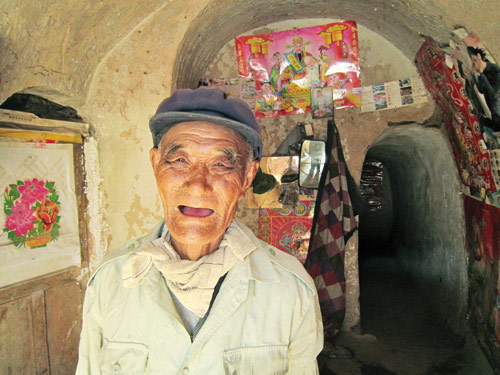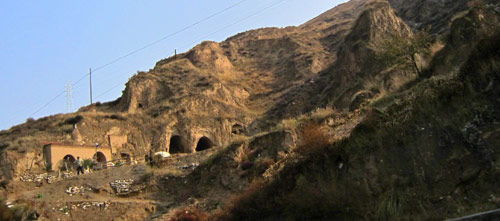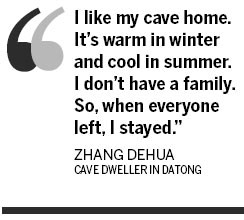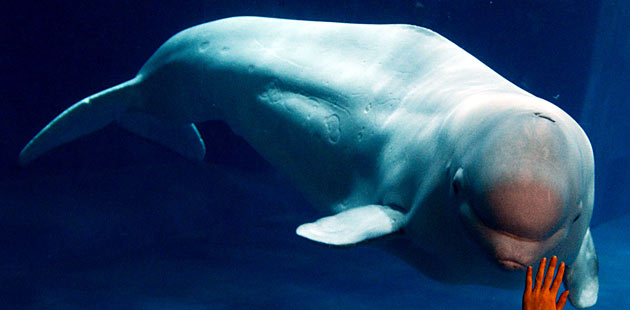Live like a hermit
Updated: 2012-09-13 13:56
By Erik Nilsson (China Daily)
|
||||||||
 |
|
Zhang Dehua insists on living in his old cavern, which he says is warm in winter and cool in summer. Photos by Erik Nilsson / China Daily |
While China has seen an exodus of people moving to the cities, Zhang Dehua prefers living in a cave in Datong. Erik Nilsson visits his sanctuary to file this story.
The caves that pock the mountains of Shanxi province's Datong were inhabited for millennia until they were cleared out half a century ago - except for one person.
Zhang Dehua is Datong's last cave dweller.
The 79-year-old was the only resident who didn't move out of his grotto in Donggetuopu village when the government built a road and new houses for locals in 1952.
"I like my cave home," Zhang says.
"It's warm in winter and cool in summer. I don't have a family. So, when everyone left, I stayed."
He believes his ancestors have inhabited his cavern for five centuries. His parents told him his great-great-great grandfather expanded it to include the secret chamber.
Zhang's family hid in the concealed room behind a false wall when invading Japanese troops plundered homes in the village.
"We would hole up behind the wall for a few hours and come out after they were gone," he recalls.
"They never found us in our secret chamber. Most people here also had hidden rooms in their caves and would seemingly vanish when the Japanese came. The place appeared deserted to them."
Zhang largely lived off the land, growing potatoes and corn in the loess. He has no teeth and a wardrobe of a single Mao suit.
 |
|
The cave where 79-year-old Zhang Dehua lives is a few kilometers from the Yungang Grottoes in Datong, Shanxi province. |
The farmer married, but his wife passed away long ago, he says.
"I just stayed here, alone," Zhang says.
"I have no hobbies."
But about four years ago, taxi driver Zhang Zhao chanced upon Zhang Dehua's cave and soon after began bringing tourists to meet the old man.
"All I do is show visitors my cave," Zhang says.
"I also grow sunflowers to give guests seeds - nothing more."
His cave's walls are plastered with photos of foreign guests, Mao posters and newspaper clippings about him. He's especially proud of the New York Times' story taped to his living room wall.
"I don't know how many people come to see me," Zhang Dehua says. "But it's a lot. It has been good for me. Otherwise, I'd be totally alone, doing nothing."
A few feral cats and small dogs keep him company when he doesn't have guests.
There are few furnishings aside from an earthen kang (a traditional bed) and a bench.
Smaller caves next to his house serve as storage for food and firewood.
Zhang Dehua hikes to the bottom of the mountain every day to get water from a nearby river.
"I'm in better shape than old people in the city because I get so much exercise," Zhang Dehua says, smiling.
Zhang Zhao says: "We always wonder why old people are so happy and healthy. Zhang Dehua shows us. It's because they don't have grand aspirations. If their bellies are full, they're satisfied."
Zhang Zhao included Zhang Dehua in the Team China Datong Respect program he started with 21 other drivers. In addition to offering Datong's senior citizens free rides, the drivers provide Zhang Dehua and another elderly man without children cash for everyday items, such as medicine, electricity, TV, cigarettes and food. Zhang Zhao brought electricity to Zhang Dehua's cave a few years ago, via wires stapled to posts.
"Every family has an elderly person," Zhang Zhao says.
"So, we should respect the elderly."
Zhang's cave is a few kilometers from the Yungang Grottoes, which have long lured outsiders to Datong. Yungang's coves are populated with thousands of Buddhist sculptures whittled in the rock in the Northern Wei Dynasty (AD 386-534).
Now, a growing number of travelers are stopping by Zhang Dehua's cavern along the way, to visit Datong's last living cave occupant and engage another dimension of Shanxi's grotto legacy.
Contact the writer at erik_nilsson@chinadaily.com.cn.












